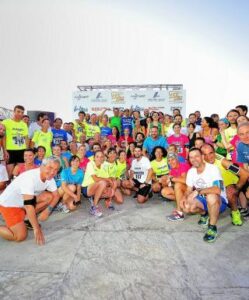
The Intergenerational Relay Race is an activity created by the Italian Athletics Federation (FIDAL) implemented during their Athletics Fest, to raise awareness about global environmental challenges through sport activities, namely by organizing a competition in the form of a relay race involving teams made by people of different ages, symbolizing the passing of the torch by old to new generations, the impact on the planet left by each of them, and the global responsibility.
Objectives:
- To raise awareness on the concepts of shared good, shared responsibility, common resources and sustainability in general
- To talk about the role of older generations in preventing climate change with different actions and decisions
- To discuss about possible ways to work together, as different generations, in preventing climate change and environmental crisis
Description:
The Intergenerational Relay Race is an activity created by the the Italian Athletics Federation (FIDAL) for their Run Fest, and it symbolizes the responsibilities of different generation in managing the planet and the environment towards the people that come after them (younger generations).
It works completely like any other relay race, but in each team there is a representative of each different age group (for example, 15-25; 26-35; 36-45; 46-55 etc.).
Each team gets a baton, and they run a relay race, where they will have to be in age order, from the oldest to the youngest.
The first runners are positioned in the beginning of the track and the next ones in the intervals planned before according to the length of the race.
The activity is a sport activity in the traditional way, but it has a powerful message to carry with it, as it symbolizes, by the passing of the baton between older and younger participants, the responsibility that each of them has towards others, and how they all have to cooperate for the wellbeing and future of the others, guaranteeing that they have an easier run or have to run faster and make more efforts to achieve the results.
In the end, it’s a peaceful, non-professional, non-competitive run, but it helps understanding the importance of taking care of our environment for future generations.
Impact and Results:
As told, the intergenerational relay race has the role of carrying an important message of care for the environment and the planet in general, representing the responsibilities of older and current generations towards the younger and future ones.
The activity can be very inspiring and managed to raise the awareness of people attending the runfest, especially participants in the relay race. It can be a powerful aggregating sporting tool with a message.
Conclusions and Suggestions for Youth Workers:
The activity can be run as a workshop, using the same rule, but adapting it to a kind of roleplay when you don’t have participants with the required age, and adding a debriefing in the end.
Suggestions on how can you play variations:
- You can play the run as a roleplay and ask each participant to run according to the age they represent, giving them rolecards.
- You can play qualifiers before to put the ones with the slower times as the older generations and vice versa
- You can symbolize the number of years that someone has lived more than others in using environmental resources by making (for example) the first one run for 400 metres; the second ones for 200 metres; the third ones for 100 metres; the last ones for 50 metres.
- You can symbolize the difficulties for the younger ages by adding obstacles in their track.
- Running can be susbstited with swimming, cycling or other activity.
Possible questions for debriefing:
- How was the activity for you?
- Did the ones that started the run feel responsible for the ones that will follow them? Did the ones that received the baton feel that the ones before could do better and you had to run faster because of them or you felt comfortable with their run?
- Was there anyone that would not even run the last battery because the other ones won already?
- Does something like this happen in your everyday life? You feel responsible as someone with more experience, more years on the back, for the future generations? What the younger ones feel about the responsibility of the ones that came before them?
- Is it like this also when it comes to the environmental issues? How do you feel it when it comes to the “passage of baton” for next generations?
- If you were in the position of one of the other ages, what would you change?
- What is the role that everyone can have in enforcing a better sustainability in your local communities?

 .
.
